2002 SUBARU IMPREZA engine
[x] Cancel search: enginePage 258 of 390
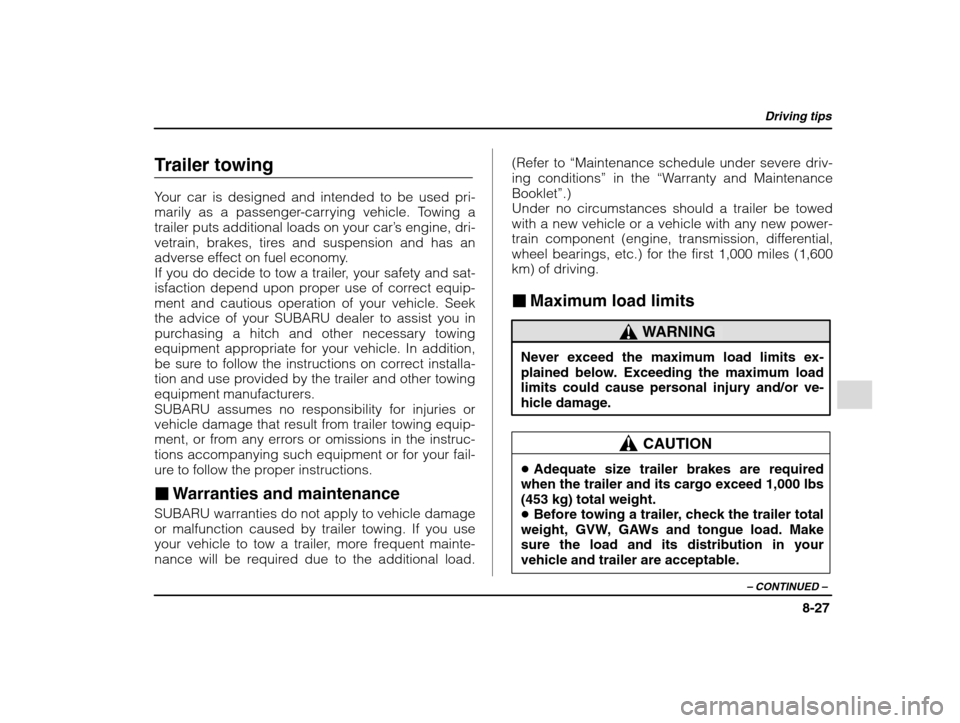
Driving tips
8-27
– CONTINUED –
Trailer towing
Your car is designed and intended to be used pri-
marily as a passenger-carrying vehicle. Towing a
trailer puts additional loads on your car ’s engine, dri-
vetrain, brakes, tires and suspension and has an
adverse effect on fuel economy.
If you do decide to tow a trailer, your safety and sat-
isfaction depend upon proper use of correct equip-
ment and cautious operation of your vehicle. Seekthe advice of your SUBARU dealer to assist you in
purchasing a hitch and other necessary towing
equipment appropriate for your vehicle. In addition,
be sure to follow the instructions on correct installa-
tion and use provided by the trailer and other towing
equipment manufacturers.
SUBARU assumes no responsibility for injuries or
vehicle damage that result from trailer towing equip-
ment, or from any errors or omissions in the instruc- tions accompanying such equipment or for your fail-
ure to follow the proper instructions. � Warranties and maintenance
SUBARU warranties do not apply to vehicle damage or malfunction caused by trailer towing. If you use
your vehicle to tow a trailer, more frequent mainte-
nance will be required due to the additional load. (Refer to
“Maintenance schedule under severe driv-
ing conditions ” in the “Warranty and Maintenance
Booklet”.)
Under no circumstances should a trailer be towedwith a new vehicle or a vehicle with any new power-
train component (engine, transmission, differential, wheel bearings, etc.) for the first 1,000 miles (1,600 km) of driving. � Maximum load limits
WARNING
Never exceed the maximum load limits ex-
plained below. Exceeding the maximum loadlimits could cause personal injury and/or ve-hicle damage.
CAUTION
�Adequate size trailer brakes are required
when the trailer and its cargo exceed 1,000 lbs (453 kg) total weight. � Before towing a trailer, check the trailer total
weight, GVW, GAWs and tongue load. Make sure the load and its distribution in your
vehicle and trailer are acceptable.
Page 267 of 390

Driving tips
8-36
�Driving with a trailer
� You should allow for considerably more stopping
distance when towing a trailer. Avoid sudden brak-
ing because it may result in skidding or jackknifing
and loss of control.� Avoid abrupt starts and sudden accelerations. If
your vehicle has a manual transmission, always start
out in first gear and release the clutch at moderate
engine revolution.� Avoid uneven steering, sharp turns and rapid lane
changes.� Slow down before turning. Make a longer than
normal turning radius because the trailer wheels will
be closer than the vehicle wheels to the inside of the
turn. In a tight turn, the trailer could hit your vehicle.� Crosswinds will adversely affect the handling of
your vehicle and trailer, causing sway. Crosswindscan be due to weather conditions or the passing of
large trucks or buses. If swaying occurs, firmly grip the steering wheel and slow down immediately but
gradually.� When passing other vehicles, considerable dis-
tance is required because of the added weight and
length caused by attaching the trailer to yourvehicle. � Backing up with a trailer is difficult and takes
practice. When backing up with a trailer, never accelerate or steer rapidly. When turning back, grip the bottom of the steering wheel with one hand and
turn it to the left for a left turn, and turn it to the right
for a right turn.
OM-H2791
1) Left turn 2) Right turn
� If the ABS warning light illuminates while the
vehicle is in motion, stop towing the trailer and have
repairs performed immediately by the nearest
SUBARU dealer.
� Driving on grades
� Before going down a steep hill, slow down and
shift into lower gear (if necessary, use 1st gear) in
order to utilize the engine braking effect and prevent
overheating of your vehicle ’s brakes. Do not make
Page 268 of 390
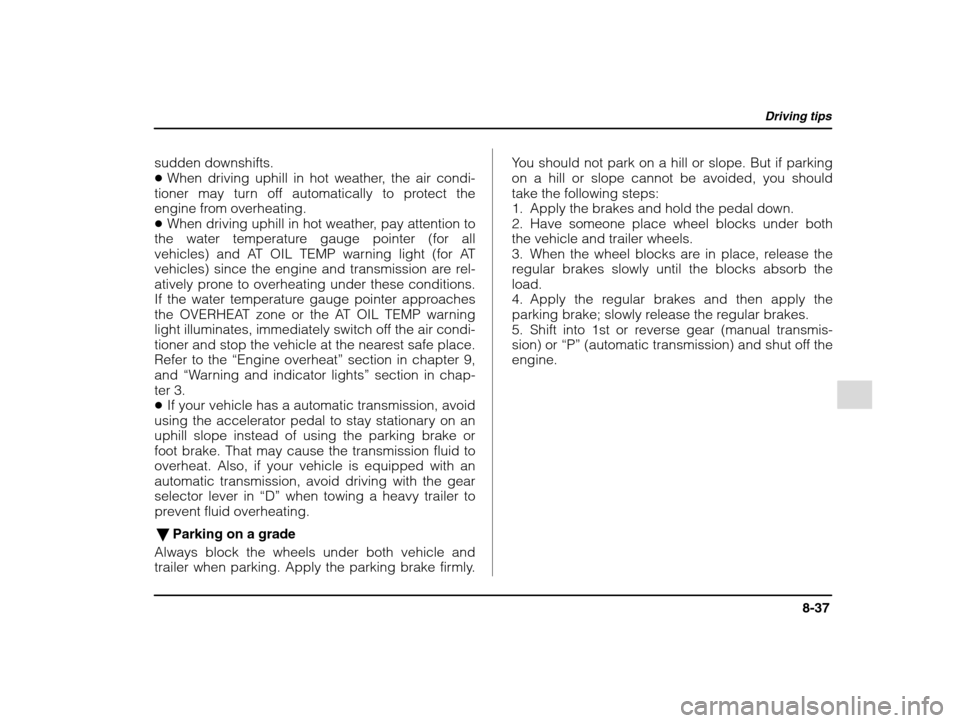
Driving tips
8-37
– CONTINUED –
sudden downshifts. �When driving uphill in hot weather, the air condi-
tioner may turn off automatically to protect the
engine from overheating.� When driving uphill in hot weather, pay attention to
the water temperature gauge pointer (for all
vehicles) and AT OIL TEMP warning light (for AT
vehicles) since the engine and transmission are rel-
atively prone to overheating under these conditions.
If the water temperature gauge pointer approaches
the OVERHEAT zone or the AT OIL TEMP warning
light illuminates, immediately switch off the air condi-
tioner and stop the vehicle at the nearest safe place. Refer to the “Engine overheat ” section in chapter 9,
and “Warning and indicator lights ” section in chap-
ter 3.� If your vehicle has a automatic transmission, avoid
using the accelerator pedal to stay stationary on an
uphill slope instead of using the parking brake or
foot brake. That may cause the transmission fluid to
overheat. Also, if your vehicle is equipped with an
automatic transmission, avoid driving with the gearselector lever in “D” when towing a heavy trailer to
prevent fluid overheating.
� Parking on a grade
Always block the wheels under both vehicle and
trailer when parking. Apply the parking brake firmly. You should not park on a hill or slope. But if parkingon a hill or slope cannot be avoided, you shouldtake the following steps:
1. Apply the brakes and hold the pedal down.
2. Have someone place wheel blocks under boththe vehicle and trailer wheels.
3. When the wheel blocks are in place, release the
regular brakes slowly until the blocks absorb theload.
4. Apply the regular brakes and then apply the
parking brake; slowly release the regular brakes.
5. Shift into 1st or reverse gear (manual transmis- sion) or
“P” (automatic transmission) and shut off the
engine.
Page 270 of 390
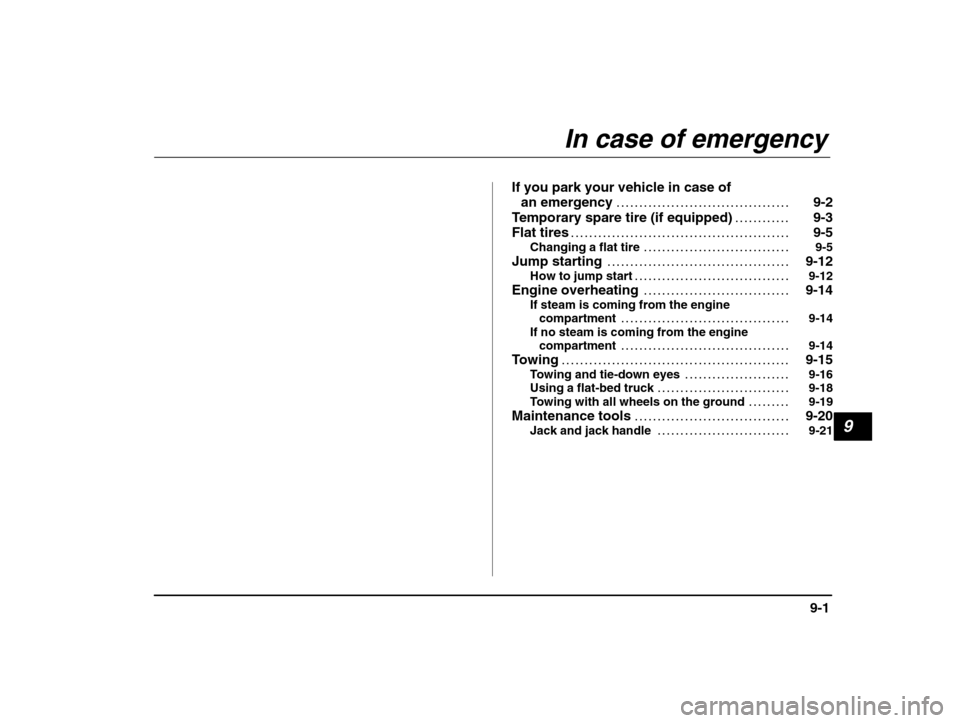
9
9-1
– CONTINUED –
If you park your vehicle in case of
an emergency 9-2 . . . . . . . . . . . . . . . . . . . . . . . . . . . . . . . . . . . . . .
Temporary spare tire (if equipped) 9-3 . . . . . . . . . . . .
Flat tires 9-5
. . . . . . . . . . . . . . . . . . . . . . . . . . . . . . . . . . . . . . . . . . . . . . . .
Changing a flat tire 9-5 . . . . . . . . . . . . . . . . . . . . . . . . . . . . . . . .
Jump starting 9-12 . . . . . . . . . . . . . . . . . . . . . . . . . . . . . . . . . . . . . . . .
How to jump start 9-12 . . . . . . . . . . . . . . . . . . . . . . . . . . . . . . . . . .
Engine overheating 9-14 . . . . . . . . . . . . . . . . . . . . . . . . . . . . . . . .
If steam is coming from the engine compartment 9-14 . . . . . . . . . . . . . . . . . . . . . . . . . . . . . . . . . . . . .
If no steam is coming from the engine compartment 9-14 . . . . . . . . . . . . . . . . . . . . . . . . . . . . . . . . . . . . .
Towing 9-15
. . . . . . . . . . . . . . . . . . . . . . . . . . . . . . . . . . . . . . . . . . . . . . . . . .
Towing and tie-down eyes 9-16 . . . . . . . . . . . . . . . . . . . . . . .
Using a flat-bed truck 9-18 . . . . . . . . . . . . . . . . . . . . . . . . . . . . .
Towing with all wheels on the ground 9-19 . . . . . . . . .
Maintenance tools 9-20 . . . . . . . . . . . . . . . . . . . . . . . . . . . . . . . . . .
Jack and jack handle 9-21 . . . . . . . . . . . . . . . . . . . . . . . . . . . . .
In case of emergency
Page 273 of 390
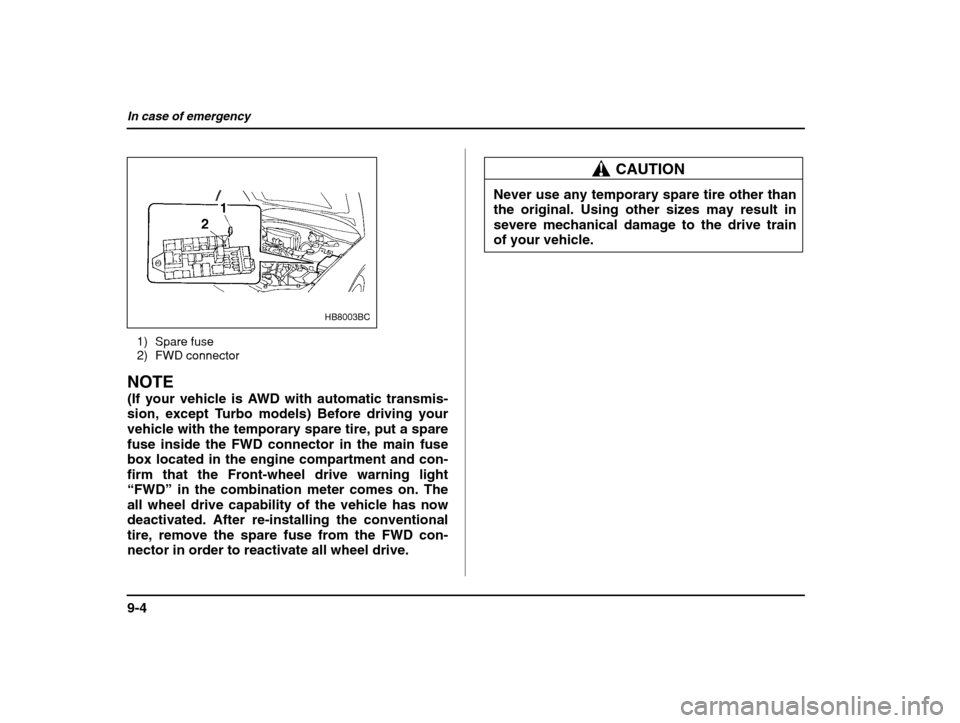
In case of emergency
9-4
HB8003BC
1) Spare fuse
2) FWD connector
NOTE
(If your vehicle is AWD with automatic transmis-
sion, except Turbo models) Before driving your
vehicle with the temporary spare tire, put a sparefuse inside the FWD connector in the main fusebox located in the engine compartment and con-firm that the Front-wheel drive warning light
“FWD” in the combination meter comes on. The
all wheel drive capability of the vehicle has now
deactivated. After re-installing the conventionaltire, remove the spare fuse from the FWD con-nector in order to reactivate all wheel drive.
CAUTION
Never use any temporary spare tire other than the original. Using other sizes may result in
severe mechanical damage to the drive train of your vehicle.
Page 274 of 390
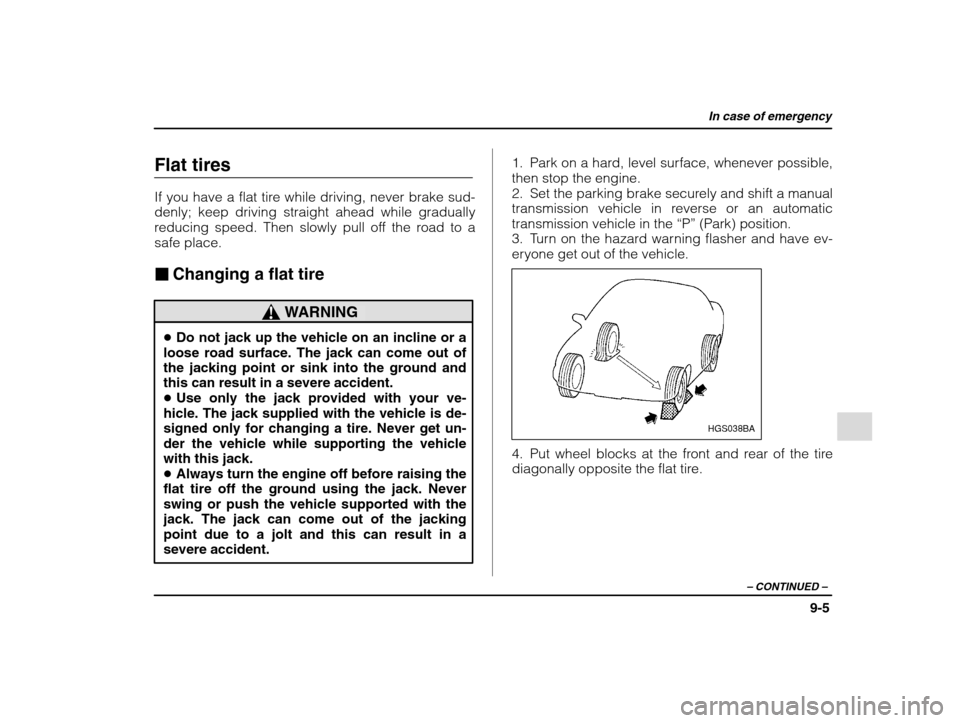
In case of emergency
9-5
– CONTINUED –
Flat tires
If you have a flat tire while driving, never brake sud- denly; keep driving straight ahead while gradually
reducing speed. Then slowly pull off the road to asafe place. �Changing a flat tire
WARNING
�Do not jack up the vehicle on an incline or a
loose road surface. The jack can come out of
the jacking point or sink into the ground and this can result in a severe accident.� Use only the jack provided with your ve-
hicle. The jack supplied with the vehicle is de-signed only for changing a tire. Never get un-der the vehicle while supporting the vehicle with this jack. � Always turn the engine off before raising the
flat tire off the ground using the jack. Neverswing or push the vehicle supported with the
jack. The jack can come out of the jackingpoint due to a jolt and this can result in a
severe accident. 1. Park on a hard, level surface, whenever possible,
then stop the engine.
2. Set the parking brake securely and shift a manual
transmission vehicle in reverse or an automatictransmission vehicle in the
“P” (Park) position.
3. Turn on the hazard warning flasher and have ev-
eryone get out of the vehicle.
HGS038BA
4. Put wheel blocks at the front and rear of the tire
diagonally opposite the flat tire.
Page 281 of 390
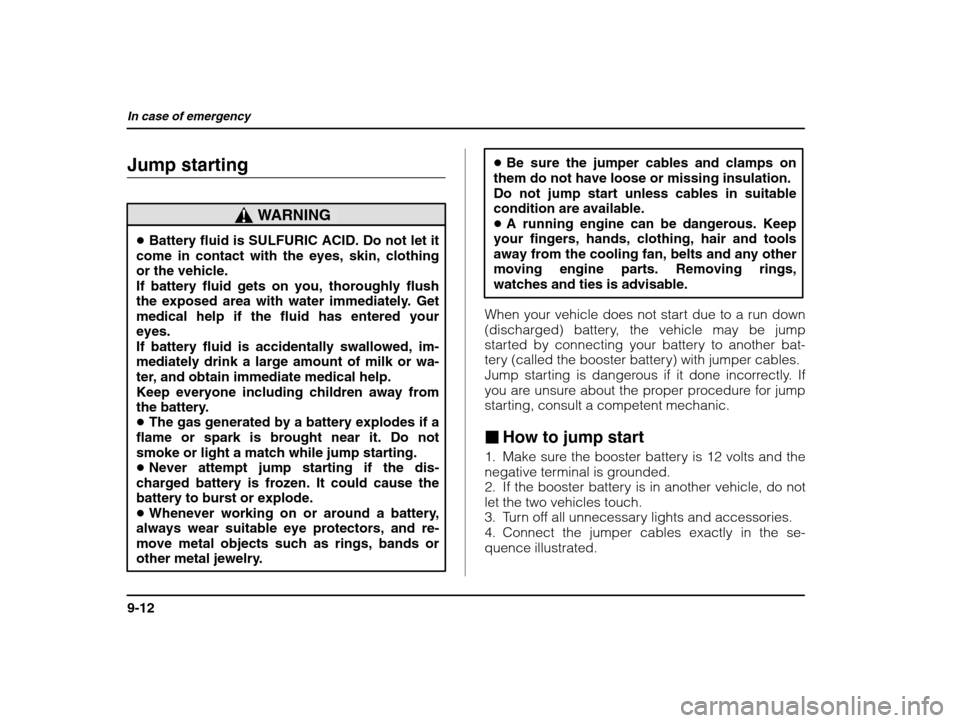
In case of emergency
9-12
Jump starting
WARNING
�Battery fluid is SULFURIC ACID. Do not let it
come in contact with the eyes, skin, clothing or the vehicle. If battery fluid gets on you, thoroughly flush
the exposed area with water immediately. Get
medical help if the fluid has entered your
eyes.
If battery fluid is accidentally swallowed, im-
mediately drink a large amount of milk or wa-
ter, and obtain immediate medical help. Keep everyone including children away from
the battery. � The gas generated by a battery explodes if a
flame or spark is brought near it. Do not
smoke or light a match while jump starting.� Never attempt jump starting if the dis-
charged battery is frozen. It could cause thebattery to burst or explode. � Whenever working on or around a battery,
always wear suitable eye protectors, and re- move metal objects such as rings, bands or
other metal jewelry. �
Be sure the jumper cables and clamps on
them do not have loose or missing insulation.
Do not jump start unless cables in suitablecondition are available.� A running engine can be dangerous. Keep
your fingers, hands, clothing, hair and tools away from the cooling fan, belts and any other
moving engine parts. Removing rings,watches and ties is advisable.
When your vehicle does not start due to a run down
(discharged) battery, the vehicle may be jump
started by connecting your battery to another bat-
tery (called the booster battery) with jumper cables.
Jump starting is dangerous if it done incorrectly. If
you are unsure about the proper procedure for jump
starting, consult a competent mechanic. � How to jump start
1. Make sure the booster battery is 12 volts and the
negative terminal is grounded.
2. If the booster battery is in another vehicle, do notlet the two vehicles touch.
3. Turn off all unnecessary lights and accessories.
4. Connect the jumper cables exactly in the se-
quence illustrated.
Page 282 of 390

In case of emergency
9-13
– CONTINUED –
HB8007BC
1) Booster battery
2) Engine lifting bracket